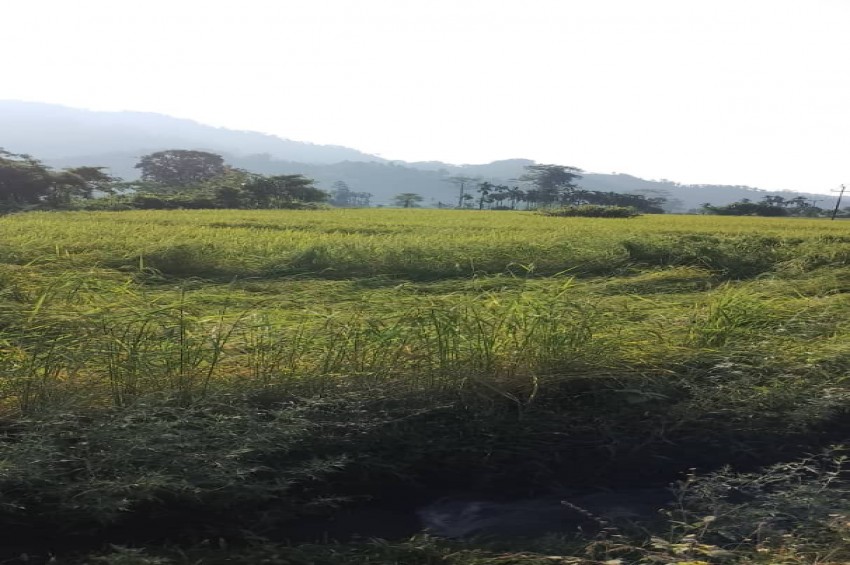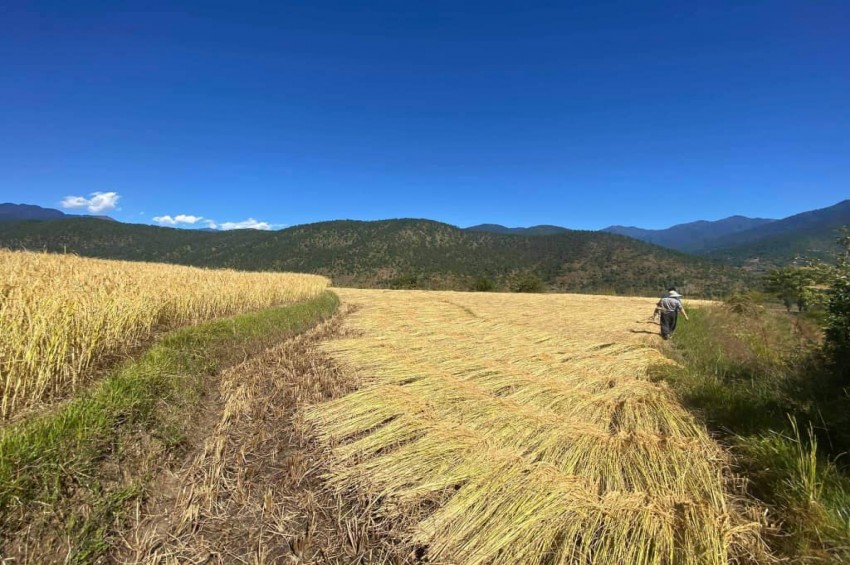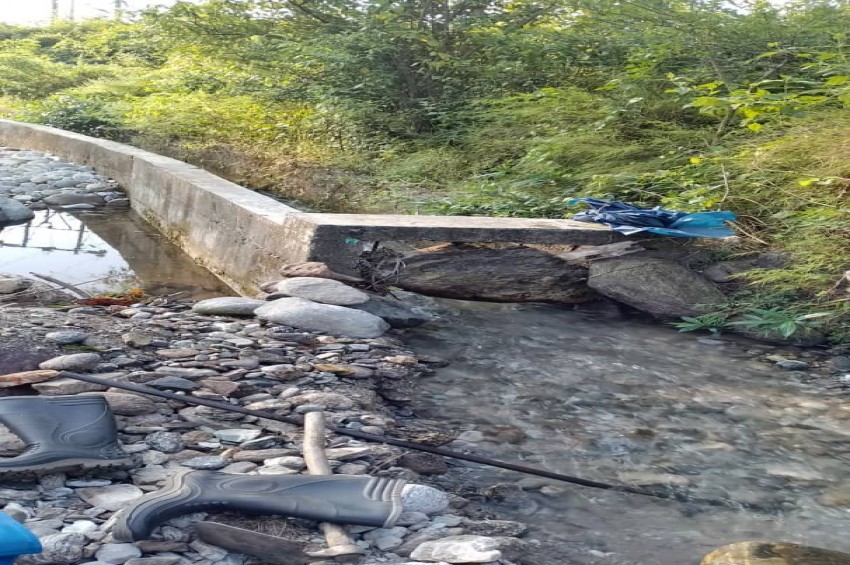Demotivated farmers request the government to change the land act rules to protect and increase the rice yield
A 45-year-old farmer Sameer from Tashicholing (Sipsoo) village broke down in anguish and despair when he saw his paddy field destroyed by the sounder of wild boar.
The wild boars are attracted to the scent of rice at this time although it’s not ripe. They trample, roll over and spend a great deal of playtime in the paddy field, destroying the crop overnight.
“All our hard work and struggle is down the drain,” said the farmer.
Sameer cultivated three acres of paddy this summer in the field passed down to him by his ancestors. He expected to harvest about 3,000 kgs of rice during the harvest season. “But it’s unlikely that I can harvest even half of what I targeted this year,” he added.
But there’s nothing much he can do. All he can do is share a disheartening story of a human-wildlife conflict, just like the rest of the villagers who lost acres of paddy to wild boar menace even before it’s ripe.
The 45-year-old in disappointment said, “Rural cries remain unheard or neglected. This issue has been there since I can remember but the policymakers aren’t taking the required measures to solve it.”
“They won’t understand what it feels to feel helpless when you lose your yearly income to wild animals,” added the farmer. He claimed that most of the farmers in his village has left the fertile land fallow and some even migrated to urban cities looking for better livelihood.
He partly blames the wild animals for the substantial loss of crops but he claims that the government and the policymakers equally deserve the blame.
He claimed that the government and cabinet ministers can at least allow the farmers to build a watch tower or a shed to guard their crops at night. However, the land act doesn’t allow the construction of any sort of infrastructure.
“We are not asking the government to allow us to build residents or buildings to rent out, we only want to build a shed where a group of farmers can gather at night to guard the paddy field,” said the farmer.
He said that the agriculture ministry receives millions as a grant to address human-wildlife conflict, yet the farmers continue to lose their crops every year to wild animals.
Most of the villagers walk for an hour to keep their crops safe, mostly residing about five kilometers away from their paddy fields.
“Farming is difficult. Our hard work is rarely paid off. It’s risky for us to walk long distances to guard our crops. It’s life-threatening and scary when we sometimes encounter those wild animals,” said the farmers.
Moreover, human-wildlife conflict in Samtse forced people to leave their arable land fallow. “Who will cultivate crops when they know that the wild animals will be the first ones to reap the harvest?” asked Sameer.
He claimed that most of the farmers in Tashicholing moved out of the village as the situation remained the same for many years. As of 2021, the Samtse dzongkhag administration recorded 1,200 acres of land left fallow as of 2021 wetland Dzongkhag administration.
Samtse is a rice bowl in the southern belt of the country with suitable farmland for winter vegetable and crop plantation. In ancient days, people used to harvest the staple food of the nation twice a year. But the increasing wildlife menace demotivated most of the farmers.
“The political leaders give marvelous talks on Bhutan heading towards food self-sufficiency but farmers are yet to hear and see what the government has been doing,” said the farmers.
The focus is so much on the electric fencing to ward off the wild animals but the farmers claimed that it isn’t serving the purpose.
Tashicholing gewog doesn’t have an irrigation problem. The small Sipsoo stream running next to the paddy field can cater to the water needed for the rice plantation in addition to the monsoon rain.
Had it not been for the wild-life conflict, Tashicholing gewog has more than 200 acres of paddy fields but only about 30-35 acres of land has been used for paddy cultivation. And the remaining massive acres of fallow land are now turning into a forest.
According to the farmers, the problems have only increased as the fallow land serves as an ambush spot for wild animals.
Apart from the boars, the farmers are anxious about another huge beast roaming the southern foothills. Elephants usually return to devour the crops during the harvest seasons. Thus, making farming life an undesirable passion.
“We want the government to support the farmer's idea of building a shed in our paddy field to chase away the wind animals and protect our crop,” said Tashicholing farmers.
A 45-year-old farmer Sameer from Tashicholing (Sipsoo) village broke down in anguish and despair when he saw his paddy field destroyed by the sounder of wild boar.
The wild boars are attracted to the scent of rice at this time although it’s not ripe. They trample, roll over and spend a great deal of playtime in the paddy field, destroying the crop overnight.
“All our hard work and struggle is down the drain,” said the farmer.
Sameer cultivated three acres of paddy this summer in the field passed down to him by his ancestors. He expected to harvest about 3,000 kgs of rice during the harvest season. “But it’s unlikely that I can harvest even half of what I targeted this year,” he added.
But there’s nothing much he can do. All he can do is share a disheartening story of a human-wildlife conflict, just like the rest of the villagers who lost acres of paddy to wild boar menace even before it’s ripe.
The 45-year-old in disappointment said, “Rural cries remain unheard or neglected. This issue has been there since I can remember but the policymakers aren’t taking the required measures to solve it.”
“They won’t understand what it feels to feel helpless when you lose your yearly income to wild animals,” added the farmer. He claimed that most of the farmers in his village has left the fertile land fallow and some even migrated to urban cities looking for better livelihood.
He partly blames the wild animals for the substantial loss of crops but he claims that the government and the policymakers equally deserve the blame.
He claimed that the government and cabinet ministers can at least allow the farmers to build a watch tower or a shed to guard their crops at night. However, the land act doesn’t allow the construction of any sort of infrastructure.
“We are not asking the government to allow us to build residents or buildings to rent out, we only want to build a shed where a group of farmers can gather at night to guard the paddy field,” said the farmer.
He said that the agriculture ministry receives millions as a grant to address human-wildlife conflict, yet the farmers continue to lose their crops every year to wild animals.
Most of the villagers walk for an hour to keep their crops safe, mostly residing about five kilometers away from their paddy fields.
“Farming is difficult. Our hard work is rarely paid off. It’s risky for us to walk long distances to guard our crops. It’s life-threatening and scary when we sometimes encounter those wild animals,” said the farmers.
Moreover, human-wildlife conflict in Samtse forced people to leave their arable land fallow. “Who will cultivate crops when they know that the wild animals will be the first ones to reap the harvest?” asked Sameer.
He claimed that most of the farmers in Tashicholing moved out of the village as the situation remained the same for many years. As of 2021, the Samtse dzongkhag administration recorded 1,200 acres of land left fallow as of 2021 wetland Dzongkhag administration.
Samtse is a rice bowl in the southern belt of the country with suitable farmland for winter vegetable and crop plantation. In ancient days, people used to harvest the staple food of the nation twice a year. But the increasing wildlife menace demotivated most of the farmers.
“The political leaders give marvelous talks on Bhutan heading towards food self-sufficiency but farmers are yet to hear and see what the government has been doing,” said the farmers.
The focus is so much on the electric fencing to ward off the wild animals but the farmers claimed that it isn’t serving the purpose.
Tashicholing gewog doesn’t have an irrigation problem. The small Sipsoo stream running next to the paddy field can cater to the water needed for the rice plantation in addition to the monsoon rain.
Had it not been for the wild-life conflict, Tashicholing gewog has more than 200 acres of paddy fields but only about 30-35 acres of land has been used for paddy cultivation. And the remaining massive acres of fallow land are now turning into a forest.
According to the farmers, the problems have only increased as the fallow land serves as an ambush spot for wild animals.
Apart from the boars, the farmers are anxious about another huge beast roaming the southern foothills. Elephants usually return to devour the crops during the harvest seasons. Thus, making farming life an undesirable passion.
“We want the government to support the farmer's idea of building a shed in our paddy field to chase away the wind animals and protect our crop,” said Tashicholing farmers.













